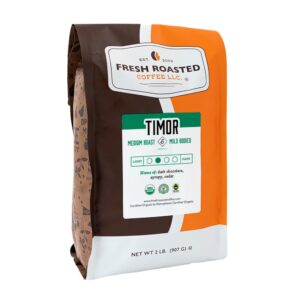As a coffee enthusiast and sustainability advocate, I’ve seen the intricate process that brings organic coffee from farm to cup. This tale intertwines environmental stewardship, traditional wisdom, and modern innovation.
The Organic Coffee Farm: A Thriving Ecosystem
Stepping onto an organic coffee farm reveals a stark contrast to conventional plantations. Instead of neat rows, you’ll find yourself surrounded by a diverse, forest-like environment.
This approach, known as shade-grown coffee, forms the foundation of organic production.
Towering trees create a protective canopy above the coffee plants, closely mimicking their natural habitat. This method offers many ecological advantages:
Natural Pest Control
The shade trees attract birds and beneficial insects that keep harmful pests in check. This natural balance reduces the need for synthetic pesticides, preserving the health of the ecosystem and the coffee plants.
Ideal Growing Conditions
The canopy helps regulate temperature and moisture levels, creating perfect conditions for slow-ripening coffee cherries. This unhurried development allows the beans to develop complex flavor profiles that set organic coffee apart.
Biodiversity Hotspots
Organic coffee farms serve as sanctuaries for wildlife. A 2014 study in ‘Agriculture, Ecosystems & Environment’ found significantly higher biodiversity levels on organic farms compared to conventional ones.
From vibrant bird species to elusive mammals, these farms support a rich collage of life.
Nurturing the Soil: The Cornerstone of Organic Coffee
Healthy, living soil forms the bedrock of exceptional organic coffee production. Organic farmers employ various techniques to cultivate and maintain soil health:
Composting
Farmers transform coffee pulp and other organic matter into nutrient-rich compost. This natural fertilizer nourishes the soil and promotes robust plant growth without relying on synthetic chemicals.
Cover Cropping
Planting beneficial plants between coffee rows serves many purposes. These cover crops prevent soil erosion, add nutrients, and enhance overall soil structure.
Intercropping
Growing complementary crops like bananas or legumes alongside coffee improves soil fertility and provides farmers with additional income streams. This diversification strategy enhances farm resilience and sustainability.
These soil-nurturing practices offer benefits beyond the coffee farm. Research by the Rodale Institute has demonstrated that organic farming methods can sequester more carbon in the soil than conventional practices.
This means that organic coffee production actively contributes to climate change mitigation.
The Art of Harvesting: Precision and Patience
When coffee cherries reach their peak ripeness, displaying a deep, vibrant red color, the harvest begins. Organic coffee production typically relies on hand-picking, a labor-intensive but quality-focused approach.
Skilled harvesters carefully choose only the ripest cherries, leaving others to mature further. This meticulous process confirms that each bean has reached it’s full flavor potential.
Timing plays a crucial role in the harvest. Picking too early results in underdeveloped flavors, while waiting too long can lead to overripe fruit.
This delicate balance needs experience and an intimate understanding of the coffee plants – knowledge often passed down through generations of coffee farmers.
Processing: Tradition Meets Innovation
After harvesting, coffee cherries undergo processing to remove the pulp and reveal the green coffee beans inside. Organic coffee can be processed using either the wet (washed) or dry (natural) method.
Wet Processing
In this method, the pulp is removed mechanically, and the beans undergo natural fermentation to eliminate the remaining mucilage. Wet processing typically results in coffee with clean, bright flavor profiles.
Dry Processing
This traditional method involves drying whole coffee cherries in the sun. As the cherries dry, the flavors develop differently, often resulting in more complex, fruity notes in the final cup.
Water conservation remains a key consideration in organic coffee processing. Many farms apply water recycling systems and utilize eco-friendly depulping machines to minimize water usage and environmental impact.
The Roasting Revolution: Unlocking Organic Potential
The final step in the coffee’s transformation occurs during roasting. Here, the unique qualities of organic beans truly come to life.
Organic coffee, grown without synthetic chemicals and in biodiverse environments, often possesses more complex flavor profiles. Skilled roasters carefully craft roasting profiles to highlight these distinctive characteristics.
Many organic coffee roasters lead the charge in the ‘third wave’ coffee movement. This approach emphasizes single-origin beans and micro-lots that showcase the terroir of specific farms or regions.
This attention to detail allows consumers to experience the full spectrum of flavors that organic coffee offers.
Challenges and Innovations in Organic Coffee Production
While organic coffee production offers many benefits, it faces it’s share of challenges. Pest management without synthetic pesticides can prove difficult, and yields are often lower than in conventional farming.
However, innovative farmers and researchers continually develop new solutions:
Integrated Pest Management
This approach utilizes natural predators, traps, and other non-chemical methods to control pests effectively.
Biodynamic Farming
Some organic farmers incorporate cosmic rhythms and natural preparations to enhance soil and plant health, taking a holistic view of the farm ecosystem.
Precision Agriculture
Technology plays an increasing role in organic farming. Tools like soil sensors, drones, and data analytics help improve resource use and increase yields sustainably.
These innovations make organic coffee production more effective and accessible to farmers worldwide.
The Future of Organic Coffee: Climate Resilience and Sustainability
Organic coffee production is poised to play a crucial role in addressing some of the biggest challenges facing the coffee industry. Climate change already impacts coffee-growing regions, with shifting weather patterns and increased pest pressures threatening crops.
Organic farming methods, with their focus on biodiversity and soil health, offer potential solutions. A long-term study conducted in Costa Rica, published in 2019, demonstrated that organic coffee farms maintained higher soil quality and microbial diversity over a 20-year period compared to conventional farms.
This resilience could prove key to ensuring a stable coffee supply in the face of climate uncertainty.
The organic coffee movement helps preserve traditional farming practices and cultural heritage in coffee-growing regions. By valuing quality over quantity and emphasizing sustainable livelihoods for farmers, organic coffee production contributes to rural development and food security in many parts of the world.
Embracing the Organic Coffee Experience
As a consumer, choosing organic coffee extends beyond personal preference. It represents a vote for a more sustainable and equitable coffee industry.
Here are some ways you can deepen your appreciation for organic coffee as found at Amazon:
Death Wish Coffee Co. Organic Dark Roast Whole Bean Coffee
A blend of Arabica and Robusta beans, this dark roast is USDA-certified organic and Fair Trade certified. It delivers a bold, smooth flavor with subtle notes of cherry and chocolate, and is known for its high caffeine content.

Cameron’s Coffee Organic Breakfast Blend
Made from 100% Arabica beans, this light roast is USDA-certified organic. It offers full flavor with a smooth finish, starting the day with a mellow flavor.
Subtle Earth Organic Coffee by Don Pablo
Grown in Honduras, these 100% Arabica beans are USDA-certified organic. The light roast highlights the coffee’s natural flavors, with a full body and subtle fruity notes.

Fresh Roasted Coffee LLC Organic Peruvian Coffee
This medium roast is USDA-certified organic and Fair Trade certified, sourced from the high-altitude regions of Peru. It offers a sweet and smooth flavor profile with notes of chocolate and nuts.
Explore Single-Origin Offerings
Seek out coffees from specific regions or even individual farms to experience the unique flavors shaped by local growing conditions.
Learn About Processing Methods
Understand how different processing techniques affect flavor profiles, and experiment with coffees processed using various methods.
Support Direct Trade Roasters
Look for roasters who have established direct relationships with organic coffee farmers. This often confirms fair compensation and promotes sustainable practices.
Experiment with Brewing Methods
Try different brewing techniques to bring out the best in your organic beans. Each method can highlight different aspects of the coffee’s flavor profile.
By understanding the intricate process that brings organic coffee from bean to cup, you can truly appreciate the care, skill, and environmental stewardship behind every brew. The next time you sip your organic coffee, take a moment to savor not just the flavors, but the story behind them – a story of biodiversity, sustainability, and the tireless work of farmers committed to producing coffee in harmony with nature.
Frequently Asked Questions
What makes coffee organic?
Organic coffee is grown without the use of synthetic pesticides, herbicides, or fertilizers. It relies on natural farming methods that promote soil health and biodiversity.
Is organic coffee more expensive than regular coffee?
Organic coffee often costs more because of lower yields, labor-intensive farming practices, and certification costs. However, many consumers find the quality and environmental benefits worth the price difference.
Does organic coffee taste better?
Many coffee enthusiasts believe organic coffee has a more complex and nuanced flavor profile because of the growing conditions and careful processing methods.
How does organic coffee farming benefit the environment?
Organic coffee farming promotes biodiversity, improves soil health, reduces water pollution, and can help mitigate climate change through carbon sequestration.
What is shade-grown coffee?
Shade-grown coffee is cultivated under a canopy of trees, mimicking the plant’s natural habitat. This method is often used in organic farming and provides many ecological benefits.
Can organic coffee help reduce pesticide exposure?
Yes, organic coffee is grown without synthetic pesticides, potentially reducing pesticide residues in the final product and minimizing environmental contamination.
What certifications should I look for when buying organic coffee?
Look for certifications like USDA Organic, Rainforest Alliance, or Bird Friendly, which ensure the coffee meets specific environmental and social standards.
How does organic coffee impact coffee farmers?
Organic farming can provide farmers with a premium price for their coffee and promote more sustainable, healthier working conditions.
Is all fair trade coffee organic?
Not necessarily. While there is often overlap, fair trade and organic are separate certifications.
Fair trade focuses on ethical trading practices, while organic certification relates to growing methods.
Can I grow organic coffee at home?
Growing coffee at home can be challenging, especially in non-tropical climates. However, if you live in a suitable region, you can apply organic principles to home coffee cultivation.
Key Takeaways
- Organic coffee production prioritizes environmental sustainability and biodiversity.
- Shade-grown organic coffee farms act as havens for wildlife and contribute to natural pest control.
- Organic farming methods can help sequester carbon and mitigate climate change.
- Hand-picking and careful processing preserve the unique flavors of organic coffee.
- Choosing organic coffee supports sustainable farming practices and rural development.
PureCoffeeCraft is a participant in the Amazon Services LLC Associate Program, an affiliate advertising program designed to provide a means for sites to earn advertising fees by advertising and linking to Amazon.com